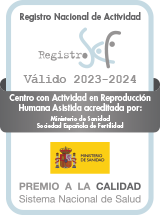Endocrine Disruptors
According to the European Fertility Society, until 1985 the normal number (based on average sperm counts) of spermatozoa in the ejaculate was 100 million/cc. Since 1986 this normality has been reduced to 60 million/cc, and since 1992 to 20 million/cc.
Already 30 years ago, the first studies were published warning about the possible deterioration of semen quality in some industrialised countries. However, despite the great concern about the decline in semen quality in developed countries, until recently this issue had not been analysed by any study at national level.
Institut Marquès began in 2002 to study the semen quality of Spanish men, first in Tarragona (study presented at the SEF congress in 2002), then in 2004 in Barcelona and La Coruña (study published in Reproductive Biomedicine) and finally in 2008 throughout Spain (I National Study of Semen in Young Men published in Andrology and carried out in collaboration with 62 reproduction centres).
In these studies, the research team at Institut Marquès, led by Dr. Marisa López-Teijón, suggests that the deterioration of male fertility may be due to environmental pollution and therefore suffer significant geographical variations.
This is due to the influence of commonly used chemical substances known as endocrine disruptors, a long list of compounds that behave like oestrogens in a woman’s body and increase her levels of the female hormone.
In a pregnant woman, this increase in her oestrogen levels can cause her to pass on too high levels of oestrogen to the embryo, which can affect the development of her testicles during the embryonic phase and lead to future problems of subfertility.
This issue has been analysed in another study on endocrine disruptors carried out by Institut Marquès and CSIC in 2011, which links poor semen quality with the transmission of toxins during pregnancy. See press release. Dr. López-Teijón, Head of Assisted Reproduction at Institut Marquès, is a member of the group of experts in endocrine disruptors of the Vivo Sano Foundation, producer of the documentary La Letra pequeña (see video) which includes her opinion and that of other international specialists from different disciplines.
Through this organisation, she promotes knowledge about the effects of chemical substances on human reproduction in different social initiatives such as the Pesticide-Free Week or the publication of the book Hogar sin tóxicos (Home without toxins) by journalist Carlos de Prada.
With the aim of raising public awareness worldwide about the effects of chemical pollution on male fertility, in 2010 Institut Marquès sponsored the Spanish participation in the North Pole Marathon.
The athlete Luis Pallarés undertook this feat dressed as a spermatozoon to denounce the fact that the Arctic has become the planet’s toxic waste dump.
Nowadays, more and more experts are joining in the denunciation of the effects of endocrine disruptors on the reproductive and general health of citizens, and are calling for more attention to be paid to this issue, which has been measured in different studies and which could be decisive for the future of humanity.



